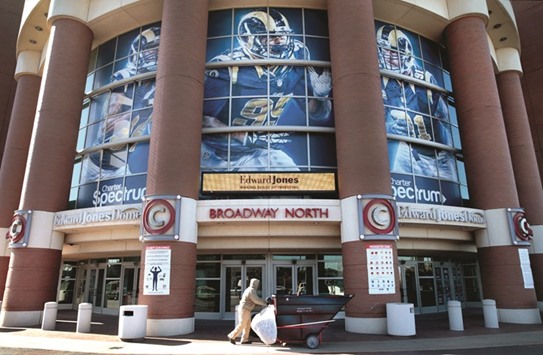As San Diego considers the pros and cons of building a new Chargers stadium, St. Louis is without an NFL team for the first time in over two decades.
The loss of a major sports team is a blow to a city's civic pride. For hardcore football fans, it can feel like a death.
The view through a broad economic lens, though, is brighter for St. Louis since owner Stan Kroenke moved the Rams to Inglewood.
Writing for Forbes, Brian Menickella notes that St. Louis and Missouri as a whole saved hundreds of millions of dollars in public funding that would've gone toward a new stadium for the Rams.
On top of the immense amount of taxpayer dollars being saved for public service improvements (schools, parks, infrastructure, etc.), the tax subsidies that had to be promised in order to build a new stadium is a crummy deal nixed before it could do any real harm.
In the end, St. Louis taxpayers and citizens came up with a surprising win.
In a similar vein, New York Times columnist Joe Nocera consoled St. Louis last month after NFL owners approved Kroenke's $2.66 billion plan for a stadium and a massive mixed development in Inglewood.
Nocera foresaw the public cost of a new Rams stadium as "ruinous" for St. Louis.
Let's not be coy about this: St. Louis, a city of fewer than 320,000 people, with a shrinking tax base, simply couldn't afford to help finance the $1 billion stadium that the Rams' billionaire owner, E. Stanley Kroenke, was seeking. Its mistake was in trying.
My take: Were Dean Spanos to move the Chargers to Inglewood, the blemish against NFL commissioner Roger Goodell, Spanos and his consultants would be larger -- far larger -- than that the Rams' move dealt the NFL.
Kroenke is returning the Rams to a metropolis where they'd played for 59 years. He's putting up $1 billion of the stadium's financing while also building an NFL campus for his 31 fellow owners. Though St. Louis supported many crummy Rams teams, he's leaving behind a shrinking city in which baseball is sports king.
San Diego is a hugely popular destination with NFL personnel and out-of-town fans.
Moving to LA would dilute three rivalries between the Chargers and their AFC West neighbors that span over half a century. Don't forget, it was an AFC West owner, Clark Hunt of the Kansas City Chiefs, who cast the lone dissenting vote within a six-owner committee that recommended Spanos' Carson plan over Kroenke's project.
"I dissented," Hunt told The MMQB's Peter King, "because I felt the NFL would be best served by having less realignment. Moving one team would be less disruptive to our fan base. And, also, having just one team in Los Angeles would give the league the best chance to be successful."
The Chargers have much deeper roots in San Diego -- 55 years -- than the Rams did in St. Louis, their home from 1995-2015. Chargers local revenues have not kept pace with NFL norms, but Forbes estimates that the Chargers in 2014 had almost twice the operating income than of the Rams ($64.8 million vs $34 million).
Kroenke referred to San Diego's market strength in his scorched-earth appraisal of the St. Louis market that preceded his exit. In bold letters, according to ESPN.com, the application said San Diego and Oakland are "substantially stronger markets than the St. Louis market". Stadium politics aside, Kroenke's point is close to the mark.

Edward Jones Dome hosted St. Louis Rams from 1995 to 2015. (St. Louis Post-Dispatch/TNS)
